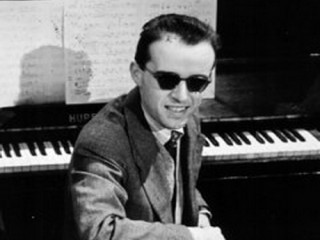
Nino Rota biography
Date of birth : 1911-12-03
Date of death : 1979-04-10
Birthplace : Rome, Italy
Nationality : Italian
Category : Famous Figures
Last modified : 2012-01-16
Credited as : Composer, Composed the music for the first two films of Francis Ford Coppola's Godfather trilogy, won the Academy Award for Best Original Score in 1974
1 votes so far
Although he worked with a variety of motion picture directors, he was best known for providing the musical scores for the most memorable films of Federico Fellini and Francis Ford Coppola. Rota's soundtrack music was uniquely reminiscent of his Italian heritage, often conjuring up a rich, romantic image of pianists and strolling violinists in an Italian piazza. Ranging from graceful and delicate to full-bodied, melodramatic compositions, his scores captured the mood of a film.
Rota's distinctive soundtracks set the dramatic tone of more than 40 films, starting with His Young Wife in 1945. In the United States, the films that brought Rota the most exposure were Coppola's Godfather and The Godfather, Part II; however, Fellini film enthusiasts throughout the world lauded the composer's scores for 1954's La Strada, 1960's La Dolce Vita, 1963's 8+, 1965's Juliet of the Spirits, and 1974's Amarcord. Rota composed dozens of scores for Fellini alone, and critics have noted that his music contributed as much to films as superb directing or acting.
Rota was born and raised in Milan, Italy, and was the grandson of pianist/composer Giovanni Rinaldi. At the age of eight, he began studying the piano and composing. Within three years, he had composed an oratorio for soloists, orchestra, and chorus titled L'infanzia di San Giovanni Battista, which was produced in Milan when he was 12. That same year, 1923, Rota entered the Milan Conservatory and benefited greatly as a private pupil of Italy's most distinguished musical teachers, including Casella and Pizzetti.
In 1925, at the age of 14, Rota composed a lyric comedy in three acts to his own text titled Il Principe porcaro, as a tribute to nineteenth-century Danish storyteller Hans Christian Andersen. The next year, Rota composed the opera Il Cappello di paglia di Firenze, which would finally be performed 20 years later. He left Milan in 1927 to study composition, conducting, and music history in Rome under Casella. From 1931 to 1932, he attended the Curtis Institute in Philadelphia on a special musical scholarship. While in the United States, he studied composition with Rosario Scalero and conducting with Fritz Reiner. During this time, he composed Serenata for orcestra in four movements, as well as Balli, written for a small orchestra.
Having completed his work in Philadelphia, Rota resumed his studies in Italy and in 1937 received an arts degree in literature from Milan University. He then taught music theory for two years--in 1937 and 1938--at the Liceo Musicale in Taranto. A year later, he became a faculty member at the Liceo Musicale in Bari, where he taught composition and harmony.
Rota maintained a close, longstanding friendship with Russian-born composer Igor Stravinsky throughout his life, yet his style was never influenced by the friendship. Rota preferred a simplicity of style; his melodies were marked by directness and his compositions were often whimsical. He was able to work in many different musical categories without sacrificing technical quality or knowledge, and this adaptability earned him an abiding respect from his musical peers.
After experimenting with various operas, symphonies, and other classical pieces in the late 1930s and early 1940s, Rota composed his first music for film--the score to His Young Wife--in 1945. By 1950 he had been named director of the Liceo Musicale in Bari and within three more years had seven additional film scores to his credit. Rota's first project for director Federico Fellini was the soundtrack to the 1954 film La Strada. Fellini then decided to use Rota for all of his future works. Rota continued to compose the music for the films of Fellini and other directors in the 1950s and 1960s, with such international efforts as The White Sheik, I Vitelloni, Star of India, War and Peace, The Great War, La Dolce Vita, The Innocents, and Purple Noon.
Rota expanded his exposure in America beyond the foreign film audience when he composed the unmistakable soundtrack for director Francis Ford Coppola's tragic Mafia epic The Godfather in 1972. The Godfather attracted a wide audience in the United States, and the film's popular score was played at that year's Academy Awards ceremony.
In 1974 Rota shared a best original dramatic score Oscar for his work with Carmine Coppola on the music to The Godfather, Part II. Around the same time, he composed the soundtrack for director Anthony Harvey's historical drama The Abdication and Lina Wertmuller's Love and Anarchy, set in 1930s Italy. He continued working on such projects as the score to the British production of Agatha Christie's Death on the Nile until shortly before his death in 1979.
















